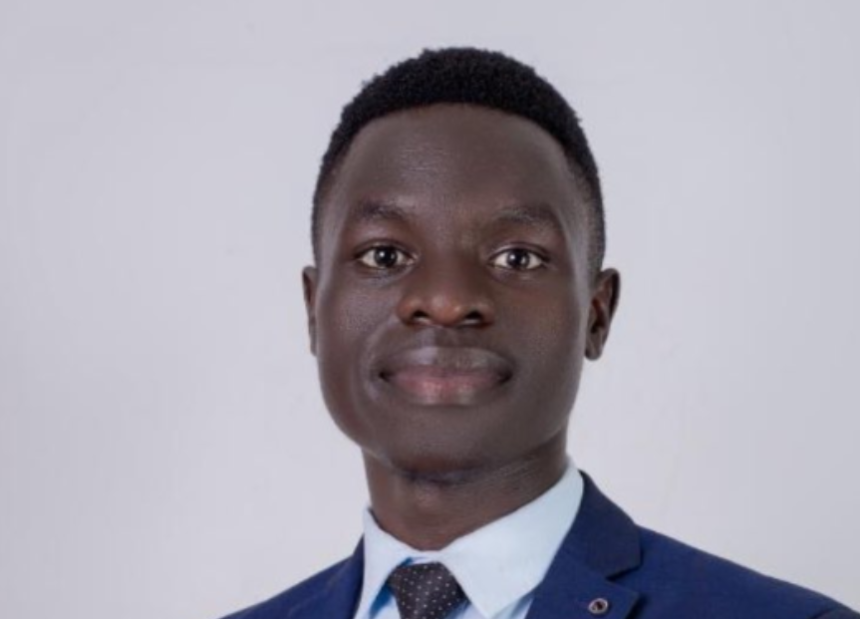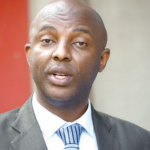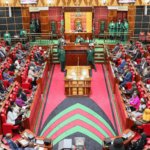Kenya School of Law (KSL) student council president Joshua Okayo has come out to narrate his experience in the hands of abductors at the height of the nationwide anti-Finance Bill 2024 demonstrations.
Okayo said he was abducted on Wednesday, June 26 near his residence in Ongata Rongai, Kajiado County. He was on Saturday, June 29 found dumped near the Maragua River in Murang’a County.
In a new interview with NTV, the student leader, who was among the vocal youth protesting President William Ruto’s government’s unpopular draft law, says he had been warned by three people that unnamed people were looking for him.
He says he was advised to stay away from his neighbourhood and lay low.
Okayo narrates how, as he was walking near his house, a man unknown to him invited him to greet three others whom the stranger called KSL comrades, to which he agreed.
He, however, soon realised that the so-called comrades were abductors after they captured, blindfolded, cuffed and forced him into a nearby car before driving off.
“They asked me, why are you demonstrating? I didn’t want to engage them, but I said it was in solidarity with other Kenyans. They asked me who our mobilisers were; and who was printing the protest materials. I told them no one was funding us,” Okayo says in the interview.
He says they pressed him about a statement he had issued calling for the release of two students arrested in the protests.
The abductors, Okayo adds, also asked who was giving them information about the International Monetary Fund (IMF)’s perceived hand in the controversial Finance Bill.
He says all this while, they had confiscated his phone. Okayo says he was then taken out of the car and forced into a room, where his abductors left him.
“When they returned later, they began hitting my ankles with metal rods, asking me the same questions. I was still blindfolded. They asked me what we stood to gain from all this. My answers were not helpful so they left me there again,” he narrates.
“I was thirsty and hungry, but when I asked them for water, they denied me and said I had to tell them who our informants and financiers were.”
He says in between the torture, they would leave him and return with the same questions until they eventually took him out of the room into a car.
“They drove me around, strangling me and hitting me in my chest and ankles with the metal rods. They then just threw me out of the car and I rolled to the roadside,” a teary Okayo recounts.
“I lay there weak and sleepy until I was woken up to find a large crowd of villagers around me, speaking Kikuyu. I could not communicate properly but I just told them ‘Nairobi’.”
The student leader says he kept phone numbers on a piece of paper in his pockets following the warnings he received on his looming abduction.
The villagers found it and called his brother who told the villagers to take him to the hospital.
After he was found near the river that Saturday, Okayo reportedly appeared to have been tortured. He was taken to Avenue Hospital in Thika and put under close observation due to the psychological trauma of the ordeal.
He claims his abductors took off his SIM cards from his phone, withdrew money from his mobile money wallet and uninstalled WhatsApp.
‘BACK TO MOI ERA’
Law Society of Kenya (LSK) President Faith Odhiambo condemned the abductions blamed on members of the police force, drawing parallels to the authoritarian era of the late former President Daniel Moi.
“This is shocking! I feel like we are going back to the Moi era; the last we heard of abductions and torture chambers. Our country is singing about and, in the region, people are praising Kenyans such abductions coming back. Some of the abducted persons have been released but others remain unaccounted for,” Odhiambo told Citizen TV.
Thirty-nine people were killed in the demonstrations between June 18 and July 1, according to the Kenya National Commission on Human Rights, which reported 361 injuries, 32 cases of “enforced or involuntary disappearances” and 627 arrests of protesters.
President Ruto later declined to assent to the Bill after mounting public pressure, instead announcing austerity measures to cover the budgetary provisions that the Bill sought to raise through increased taxation.
But his government has denied that police officers were involved in abductions and even defended the conduct of plainclothes police officers, who were linked to the abductions and killings.
Interior Cabinet Secretary Kithure Kindiki on Tuesday said the government would take action against “claims of abductions and enforced disappearances allegedly perpetrated by security personnel” during the protests.
While Kindiki did not outline any specific cases, he said investigative agencies had since launched a probe into the matter.
“Independent constitutional and statutory agencies will investigate and prosecute any person or official who may be implicated with violating the Constitution by perpetrating confinement of any person outside the law,” the security minister said in a statement.



